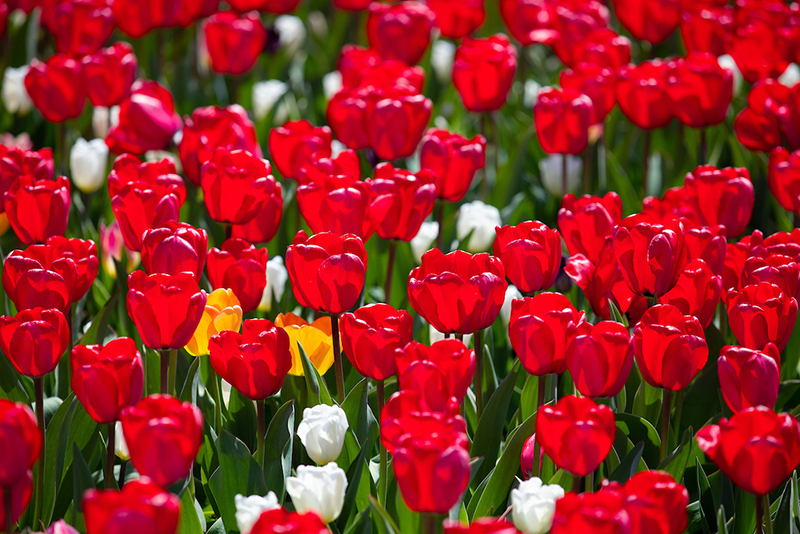Study spot
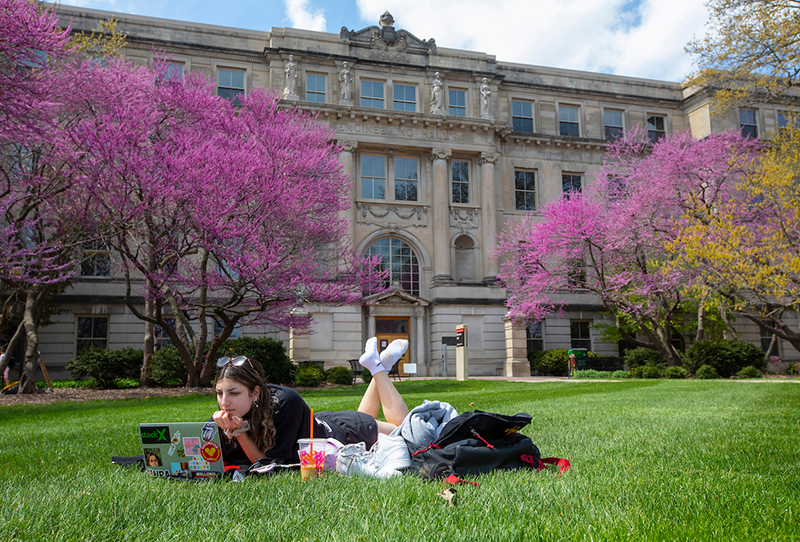
Photo by Christopher Gannon.
Kinesiology and health freshman Julia Capone prepped for finals week Monday afternoon surrounded by vivid spring colors on the library quadrangle. Marston Hall is behind her. Semester final exams begin Monday and conclude Thursday, May 6.
University awards honor more than 70 faculty and staff
More than 70 Iowa State faculty and staff will be recognized this fall for winning one of the university's annual awards, which include a new category honoring interdisciplinary team research. Following is the list of the employees and the promotions or awards for which they will be recognized.
Distinguished Professor
The title of Distinguished Professor, first awarded in 1956, is Iowa State's highest academic honor. It recognizes a faculty member whose accomplishments in research or creative activities have had a significant impact on their discipline nationally or internationally and who has demonstrated outstanding performance in at least one other area of faculty responsibility. Nominees must hold the rank of professor and have served at least five years on the Iowa State faculty. The awardee retains the title for the remainder of their career at the university.
Anson Marston Distinguished Professor in Engineering
- Duane Johnson, F. Wendell Miller Professor of Energy Sciences in materials science and engineering
Distinguished Professor in Liberal Arts and Sciences
-
Dean Adams, professor of ecology, evolution and organismal biology
-
Carolyn Cutrona, associate dean, Graduate College, and professor of psychology
-
Reuben Peters, Roy J. Carver Professor of Biochemistry, Biophysics and Molecular Biology
University Professor
The title of University Professor is awarded to a faculty member who has acted as a change agent by making significant contributions to improve the university and who has demonstrated outstanding performance in at least one other area of faculty responsibility. Nominees must hold the rank of professor and have served at least 10 years on the Iowa State faculty. The awardee retains the title for the remainder of their career at the university.
-
Claire Andreasen, Dr. Roger and Marilyn Mahr Professor in One Health in veterinary pathology
-
Michael Golemo, professor of music
-
Daniel Loy, professor of animal science and director of the Iowa Beef Center
Morrill Professor
The title of Morrill Professor is conferred on a faculty member who has exhibited excellence in undergraduate or graduate teaching or extension and outreach programs and who has demonstrated outstanding performance in at least one other area of faculty responsibility. Nominees must hold the rank of professor and have served at least five years on the Iowa State faculty. The awardee retains the title for the remainder of their career at the university.
-
Locke Karriker, Dr. Douglas and Ann Gustafson Professor for Teaching Excellence in Veterinary Medicine in veterinary diagnostic and production animal medicine
-
Charles Kostelnick, professor of English
-
Steven Lonergan, professor of animal science
Regents Award for Faculty Excellence
The award is presented by the state Board of Regents to recognize tenured faculty members who are outstanding university citizens and have rendered significant service to the university or the state of Iowa.
-
Michael Bailey, professor of history
-
Lynn Clark, professor of ecology, evolution and organismal biology
-
Heather Greenlee, professor of biomedical sciences
-
Donna Niday, associate professor of English
-
Steven Whitham, professor of plant pathology and microbiology
Regents Award for Staff Excellence
The award is presented by the state Board of Regents to recognize members of either the professional and scientific or merit staffs who are outstanding university citizens and have rendered significant service to the university or the state of Iowa.
-
Beth Doran, beef program specialist, ISU Extension and Outreach
-
April Franksain, secretary, civil, construction and environmental engineering
-
Lesya Hassall, instructional technology specialist, Center for Excellence in Learning and Teaching
-
Kristen Obbink, public health veterinarian, Center for Food Security and Public Health
-
Jerry Zamzow, associate vice president for research
Award for Inclusive Excellence
The award recognizes faculty, professional and scientific staff and merit staff who have advanced the university's mission of diversity, equity and inclusion beyond their usual job responsibilities.
-
Elaine Phompheng, student services specialist, agricultural and biosystems engineering
-
Valentina Salotti, associate dean for academic affairs, College of Business, and associate professor of finance
International Service Award
The award recognizes a faculty member for outstanding international service in teaching, research or administration within the United States or abroad.
-
Ann Marie Fiore, University Professor of apparel, events and hospitality
Outstanding Achievement in Teaching
The award recognizes a faculty member for outstanding teaching performance over an extended period of time.
-
Michael Bootsma, associate teaching professor of accounting
-
Erin Wilgenbusch, associate teaching professor, Greenlee School of Journalism and Communication
-
Louis Thompson Distinguished Undergraduate Teaching designation: Jonathan Tsou, associate professor of philosophy
Early Achievement in Teaching
The award recognizes a faculty member who has demonstrated outstanding teaching performance unusually early in their career.
-
Cason Murphy, assistant professor of theatre
-
Mohamed Selim, assistant teaching professor of electrical and computer engineering
-
Melissa Tropf, clinical assistant professor of veterinary clinical sciences
James Huntington Ellis Award for Excellence in Undergraduate Introductory Teaching
Established by a 1928 Iowa State graduate, the award recognizes a faculty member for exceptional achievement in teaching introductory courses.
-
Kate Padgett Walsh, associate professor of philosophy
-
Shenglan Zhang, associate professor of world languages and cultures
Margaret Ellen White Graduate Faculty Award
Established by a longtime staff member of the Graduate College, the award recognizes superior performance by a member of the graduate faculty in enriching the student-professor relationship and enabling students to finish their work in a timely and scholarly manner.
-
Thomas Holme, Morrill Professor of chemistry
Departmental Leadership
The award recognizes a department chair or school director who has demonstrated exceptional leadership qualities in advancing the faculty, staff, students and programs in their department.
-
Frank Krennrich, chair of physics and astronomy
Early Achievement in Departmental Leadership
The award recognizes the exceptional impact of a department chair or school director within the first three years of their leadership role.
-
Li-Shan Chou, chair of kinesiology
-
Amanda Fales-Williams, Tyrone D. Artz, M.D. Chair for Teaching Excellence in Veterinary Medicine in veterinary pathology
-
Volker Hegelheimer, chair of English
Academic Advising Impact
The award recognizes outstanding performance by an academic advisor over an extended period of time.
-
Jennifer Bundy, assistant professor of animal science
-
Alyssa Mittleider, academic advisor, mechanical engineering
Early Achievement in Academic Advising
The award recognizes outstanding performance by an academic advisor early in their career.
-
Kelsey Powell, academic advisor, animal science
Outstanding Achievement in Research
The award recognizes a tenured faculty member who has a national or international reputation for contributions in research and/or creative activity.
-
John Levis, Angela B. Pavitt Professor in English
-
Thomas Lubberstedt, K.J. Frey Chair in Agronomy
-
Christian Meissner, professor of psychology
Mid-Career Achievement in Research
The award recognizes a tenured or tenure-track faculty member who has demonstrated exemplary performance or scholarship in research and/or creative activity as documented by peers or experts in the field.
-
Phillip Gauger, associate professor of veterinary diagnostic and production animal medicine
-
Laura Jarboe, Cargill Professor in Chemical Engineering
-
Michelle Soupir, professor of agricultural and biosystems engineering
Early Achievement in Research
The award recognizes a tenured or tenure-track faculty member who has demonstrated outstanding accomplishments in research and/or creative activity unusually early in their professional career.
-
Robbyn Anand, assistant professor of chemistry
-
Nigel Reuel, assistant professor of chemical and biological engineering
Interdisciplinary Team Research Award
The award recognizes an interdisciplinary team of two or more faculty researchers with outstanding achievements who have made a significant contribution to the university's research and scholarship mission through successful interdisciplinary collaborations.
- Data Sciences for the Public Good (Todd Abraham, assistant director of data and analytics, Iowa Integrated Data System; Cassandra Dorius, associate professor of human development and family studies; Shawn Dorius, associate professor of sociology; Heike Hofmann, professor of statistics; Jim Reecy, associate vice president for research; Christopher Seeger, professor of landscape architecture; and Adisak Sukul, associate teaching professor of computer science)
Professional and Scientific Research Award
The award recognizes a professional and scientific staff member employed at Iowa State at least five years for excellence in research.
-
Maro Ibarburu-Blanc, research scientist, animal science
Achievement in Intellectual Property
The award recognizes individuals or teams of faculty or professional and scientific staff for outstanding university-based achievements in producing intellectual property.
-
Nigel Reuel, assistant professor of chemical and biological engineering
Achievement in Economic Development in Iowa
The award recognizes individuals or teams of faculty or professional and scientific staff for outstanding university-based achievements in advancing the state of Iowa's economic development.
-
America's Small Business Development Center at Iowa State (Dave Biedenbach, Sheri Benson, Stacy Dreyer, Ethan Pitt, Alicia Smith, Jan Owens Bruene, Austin Strawhacker, Jenica Johnson and Brianna Hall)
Professional and Scientific Excellence Award
The award recognizes contributions made by a professional and scientific staff member within and beyond the university and career progress demonstrated by accomplishments at Iowa State.
-
Jessica Bell, research administrator, Grants Hub
-
Sunghwan Kim, research scientist, Institute for Transportation
-
Eric Schares, librarian, University Library
Carroll Ringgenberg Award
Named for a longtime staff member in purchasing and facilities, the award recognizes an extraordinary professional and scientific staff member who exhibits constant and contagious dedication to and goodwill for Iowa State.
-
Peter Lelonek, research administrator, office of the vice president for research
Professional and Scientific Outstanding New Professional Award
The award recognizes a professional and scientific staff member who has demonstrated outstanding accomplishments unusually early in their professional career.
-
Hanna Bates, program specialist, Water Resources Research Institute
-
Paul Kremer, research manager, civil, construction and environmental engineering
-
Kathleen Ross, research scientist, Nanovaccine Institute
Distinguished Service in Extension and Outreach
The highest award bestowed on an extension professional recognizes sustained distinguished performance and educational contributions to Iowa State's clientele through extension programs.
-
Daniel Loy, professor of animal science and director of the Iowa Beef Center
Outstanding Achievement in Extension or Professional Practice
The award recognizes a faculty or staff member who has demonstrated outstanding performance in statewide leadership in extension or professional practice, and has achieved national recognition for outreach activities.
-
J. Gordon Arbuckle, professor of sociology
-
Matthew Wenger, program specialist, animal science
Early Achievement in Extension or Professional Practice
The award recognizes a faculty or staff member who has demonstrated outstanding accomplishments in extension or professional practice unusually early in their career.
-
Eric Christianson, community and economic development specialist, ISU Extension and Outreach
-
Yuko Sato, assistant professor of veterinary and diagnostic production animal medicine
R.K. Bliss Extension Award
Named for the director of Extension from 1912 to 1946, the award recognizes outstanding achievement of an extension staff member for developing an overall or continuing extension education program.
-
Barbara Woods, special projects manager, Human Sciences extension and outreach
Second year of inclusive classroom training focuses on belonging
The first year of inclusive classroom training provided a base for instructors. The approach in 2021-22 will be more individualized to each department.
The training began in 2020 after President Wendy Wintersteen addressed student concerns of racism and discrimination on campus. The goal is for participants to understand why teaching inclusively is important and to identify course-specific improvements that can be made to encourage inclusiveness.
The second year focuses on the theme, "Our students: Creating a sense of belonging."
"There is a need for our students to feel like they have a place, and that place of belonging helps support their work and learning," Center for Excellence in Learning and Teaching (CELT) program specialist Laura Bestler said.
CELT director and Morrill Professor Sara Marcketti said as her staff researched topics for training, it became clear that belonging is a foundational idea for students.
"Sense of belonging is very closely tied to recruitment and retention," she said. "If a student feels like they belong on campus and in a classroom, they will be more motivated to try to do well and persist through graduation."
Belonging became more important during the COVID-19 pandemic when feelings of isolation set in for many.
"As we were trying to deal with the pandemic, time and time again we heard building community, engaging with each other, engaging with the instructor and making sure you show who you are with your students is critical to the idea of belonging," Bestler said.
Training
CELT will conduct training this fall with the goal of concluding by the end of the semester. The pandemic forced a scheduling shift with training flipping to each fall and assessment and preparation for the next year occurring in spring. CELT will contact department chairs and departmental facilitators in the next week or two to schedule trainings either in person or synchronously online.
The training focuses on active learning, with department leaders selecting from five scenarios to suit their faculty members' needs. The scenarios, drawn from real-life experiences, range from small or large classrooms to online or hybrid instruction. Training can last from an hour to two hours based on department preference.
"This select-from approach will allow the departments to tailor the training to their situations and provide even more time for collegial discussion,” Marcketti said.
Every faculty member is expected to take part in the fall semester training. CELT is expanding the training to include graduate student teaching assistants during the 2021-22 year. Faculty have readings to complete before attending a training, but the majority of the session will be discussion among faculty members in small and large groups. Providing examples and addressing issues with peers was something faculty asked for after the first year, Marcketti said.
The CELT Academic Equity and Inclusive Classroom Advisory Board and the CELT Advisory Board reviewed the training.
"Both boards were pleased with the structure and focus of the training," Marcketti said.
Second year
CELT staff sought opinions from those who deal directly with students to prepare for the upcoming training.
"We met with numerous student affairs practitioners across campus," Bestler said. "We asked them to tell us about their students and give us three to five things they would want faculty to know in regards to inclusion."
During the first year of training, the theme emerged that faculty should look inward to realize how their experiences impact their teaching. Many instructors benefited from reviewing student development theories and remembering to teach students, not just course content, Marcketti said.
Training also will alert faculty to resources on campus that help students through various issues.
Lasting impact
To keep the idea of an inclusive classroom close throughout the year, faculty will be asked to develop an individual inclusive classroom action plan. It allows them to take what they learn from the training and apply it, Bestler said.
"If the department chooses to do more with that, it would be up to it to determine what the next step would be," she said. "We want to continue the conversation."
CELT also developed more programming around the idea of equity and inclusivity, including a faculty and staff equity and inclusion speaker series.
Voices of clinic volunteers
When the ISU mass vaccination clinic opened in State Gym earlier this month, there was a resounding -- and fast -- response to a call for faculty and staff to fill hundreds of volunteer shifts. More than 350 employees were on board within 24 hours. Another call for volunteers is expected soon to fill shifts for clinics after spring commencement. This week, Inside asked a few volunteers to reflect on their experience in State Gym -- and what they would say to someone who hasn't received a vaccine yet.
Shelley Taylor, director of global programs, College of Agriculture and Life Sciences
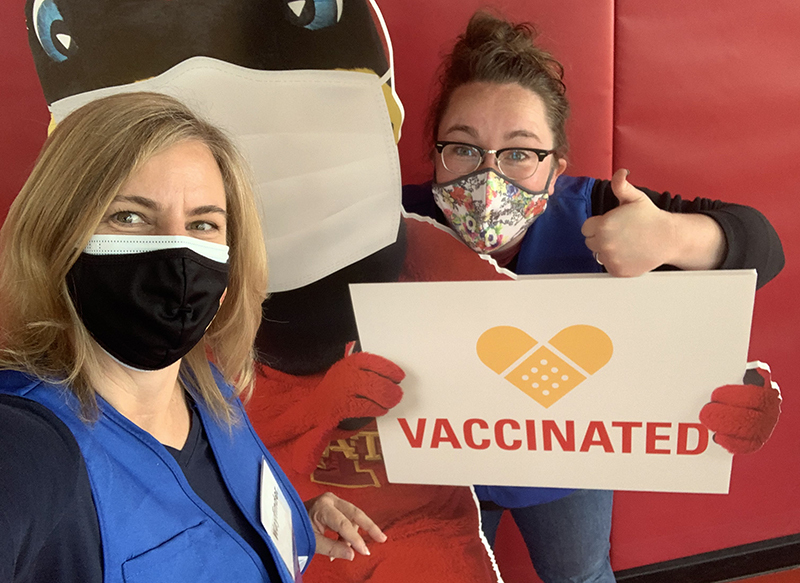
Shelley Taylor (left) with fellow volunteer Heidi Ackerman, agronomy academic advisor
Taylor volunteered as a wayfinder, helping to make sure those who came for their vaccines knew how to navigate the space in State Gym.
A moment I'll remember: "At the end of the day, a call went out to find people to come and take doses that were left over. Two students showed up, out of breath. They had received a text saying 'Come immediately,' so they dropped what they were doing and ran full speed to State Gym. It turns out they were in the middle of taking an online exam. They planned to rush back after their vaccine to finish the exam.
"Also, I spoke to several students who were scared of needles and really nervous. The people giving the shots were so kind and so professional. They really helped each of those students through their fear. Even after thousands of doses given, the people administering the shots treated each person as an individual with different needs, and not just one more person on an assembly line."
How I felt as a volunteer: "After my shift, I felt great. It was such a well-organized effort, and I was proud to be a part of it. If you get a chance to volunteer at a future vaccine clinic, definitely do it. As an employee, an alum and a parent of a student, I am very proud to be a Cyclone. I feel surrounded by a large team of professionals working hard each day to make the best choices available and take the best actions to protect the Cyclone Nation."
What I'd tell someone who hasn't yet received their shot: "I'd encourage them to sign up and get it -- not just for their own health, but for the health of the community. It is difficult to tell someone what to do with their personal health, but vaccines protect the whole population."
Kent Kerby, assistant dean for academic student success, College of Liberal Arts and Sciences
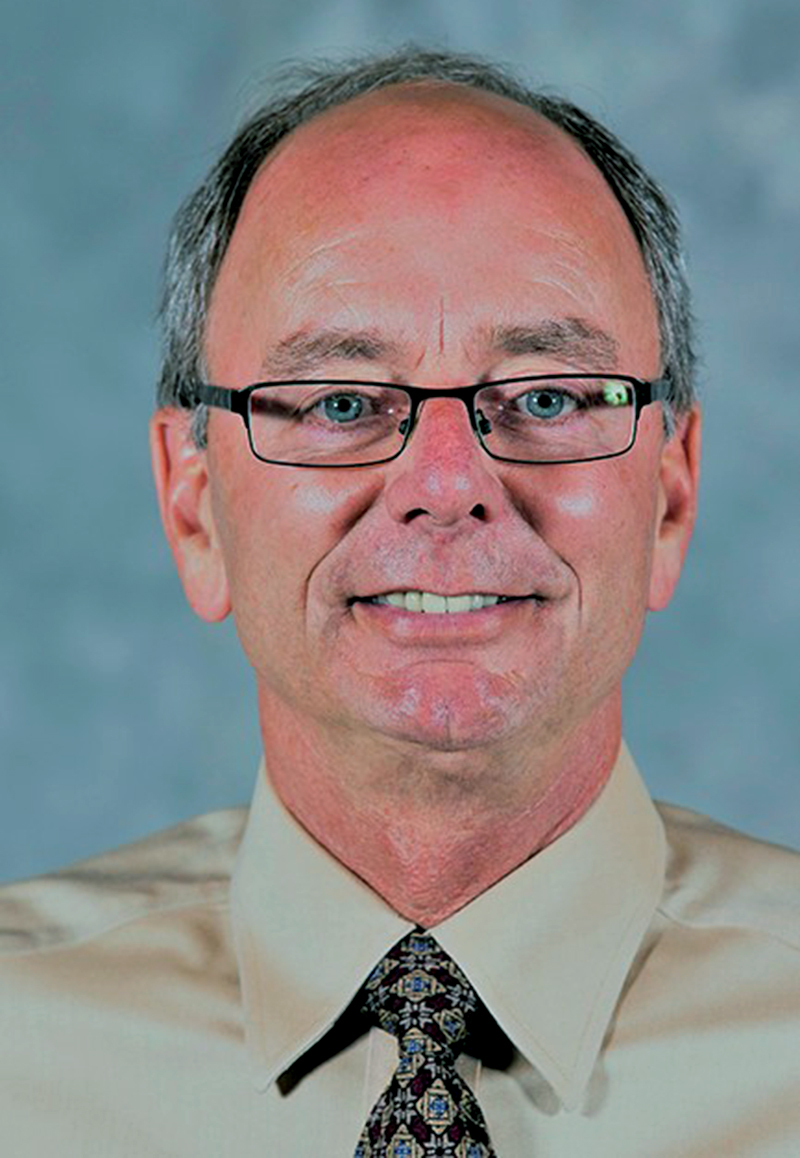
Kent Kerby
Kerby also volunteered as a wayfinder.
A moment I'll remember: "Just the smiles and relief on the faces of the students who were grateful for the vaccine."
How I felt as a volunteer: "It felt great. It has a big impact on our students, and it was enjoyable. Everyone did a nice job coordinating a well-run event."
What I'd tell someone who hasn't yet received their shot: "Don't hesitate. Bring a friend to support you and get the shot together."
Alejandro "Alex" Ramirez, Roy A. Schultz Professor in Swine Medicine, assistant dean for academic and student affairs, College of Veterinary Medicine
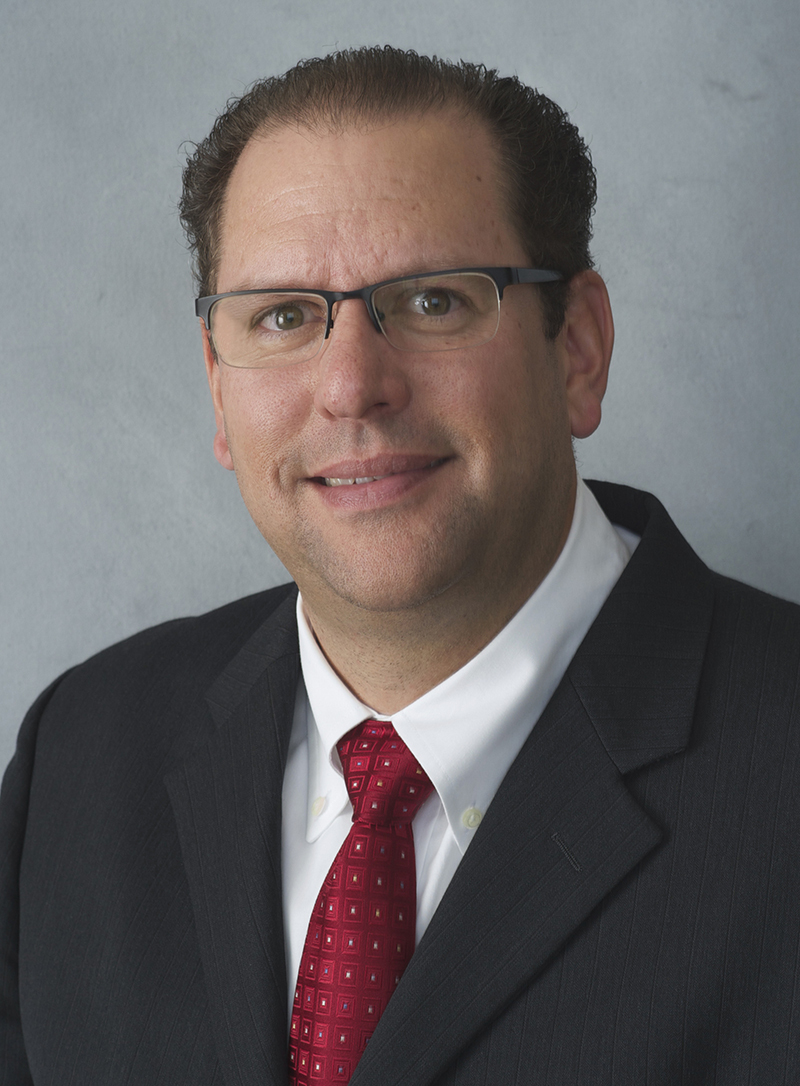
Alex Ramirez
Ramirez administered the vaccine to clinic-goers.
A moment I'll remember: "The first person I've ever vaccinated commented, 'Wow, that was really easy, I did not feel anything, you must be good at this.'
"It is very rewarding, and everyone, including the students being vaccinated, are friendly and appreciative. Our ISU health team has this down to a perfected science. Everyone does an excellent job with a smile on their face. Definitely a great memory."
How I felt as a volunteer: "It was great to feel I am doing all I can to help the ISU community through this pandemic. Not only did I help individuals get vaccinated, but I helped our entire ISU community -- by helping contribute to our herd immunity, so that we can soon return to our more normal socialization and everyday life."
What I'd tell someone who hasn't yet received their shot: "It is quick and easy. We cannot let this pandemic get the best of us. Do it for yourself, your family and our community!"
Fred Lloyd, assistant director, Veterans Center
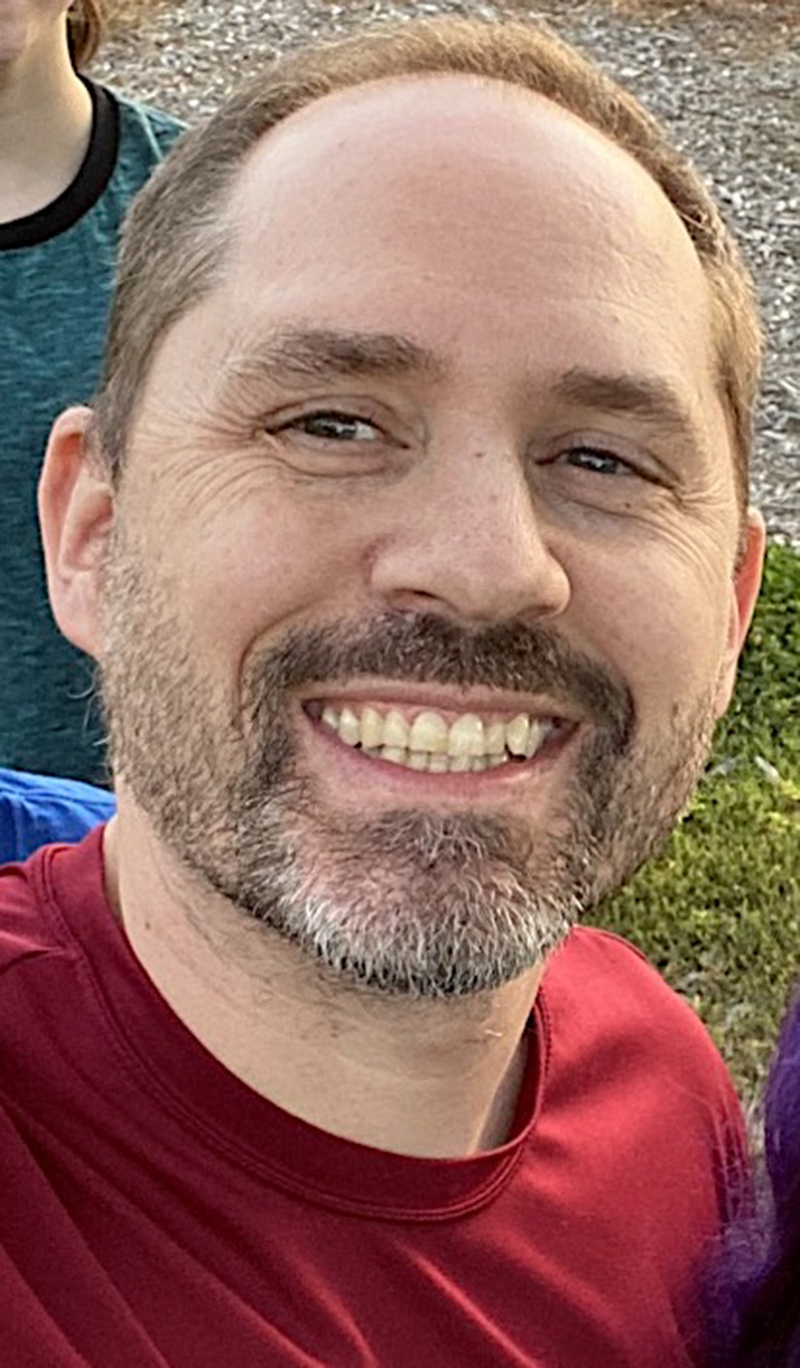
Fred Lloyd
Lloyd volunteered as a wayfinder.
A moment I'll remember: "This sounds strange, but my favorite interactions were with those who came in afraid to get the shot. I was inspired to think of the people who genuinely were scared, but were still coming to get the vaccine. I remember two young women making their way through the line, who asked if they could go to the same vaccination station so they could be together. After they were told, yes, it was possible, I asked them why they were afraid. Like many others, they told me it was the needle. I did my best to comfort them and assure them that the needle was small and they would hardly feel it. Later, I looked over to where they were getting the vaccine, and the first had finished. She smiled at me and gave me a thumbs up. I am very proud of everyone who overcame whatever obstacle they were facing and came in anyway."
How I felt as a volunteer: "After my shift was over, physically I was tired, but emotionally I felt great. It was the first time since the pandemic started that I felt like I was directly helping do something to end it. It was very rewarding. You get to interact with wonderful people."
What I'd tell someone who hasn't yet received their shot: "Please seriously consider getting one. It is scientifically the best way to protect yourself and help ISU get back to normal operations in the fall."
Erin Kalkwarf, diagnostic associate, Veterinary Diagnostic Laboratory
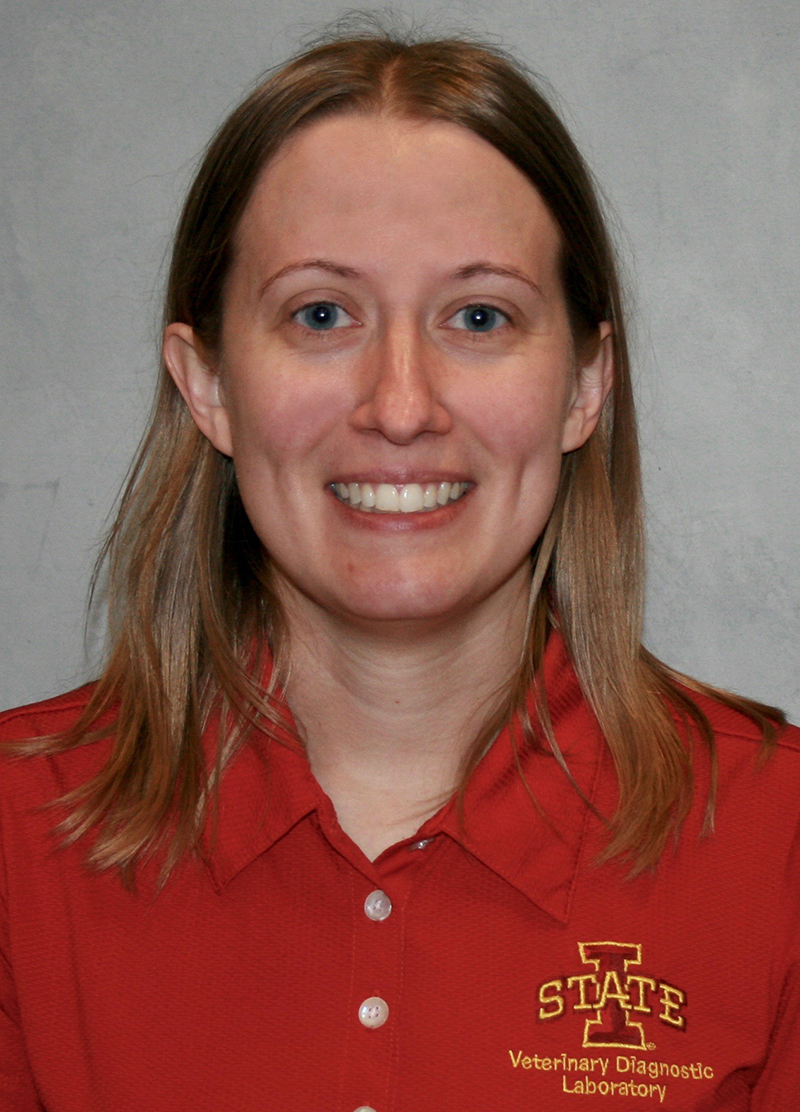
Erin Kalkwarf
Kalkwarf helped register students, faculty and staff as they entered the clinic.
A moment I'll remember: "Having people show up for walk-in shots at the last minute. A lot seemed relieved or happy to be getting the vaccine."
How I felt as a volunteer: "Very happy. It was just really great to be able to help out. Volunteer if you have time!"
What I'd tell someone who hasn't yet received their shot: "Please -- get vaccinated."
Melea Reicks Licht, interim director, College of Agriculture and Life Sciences communications service
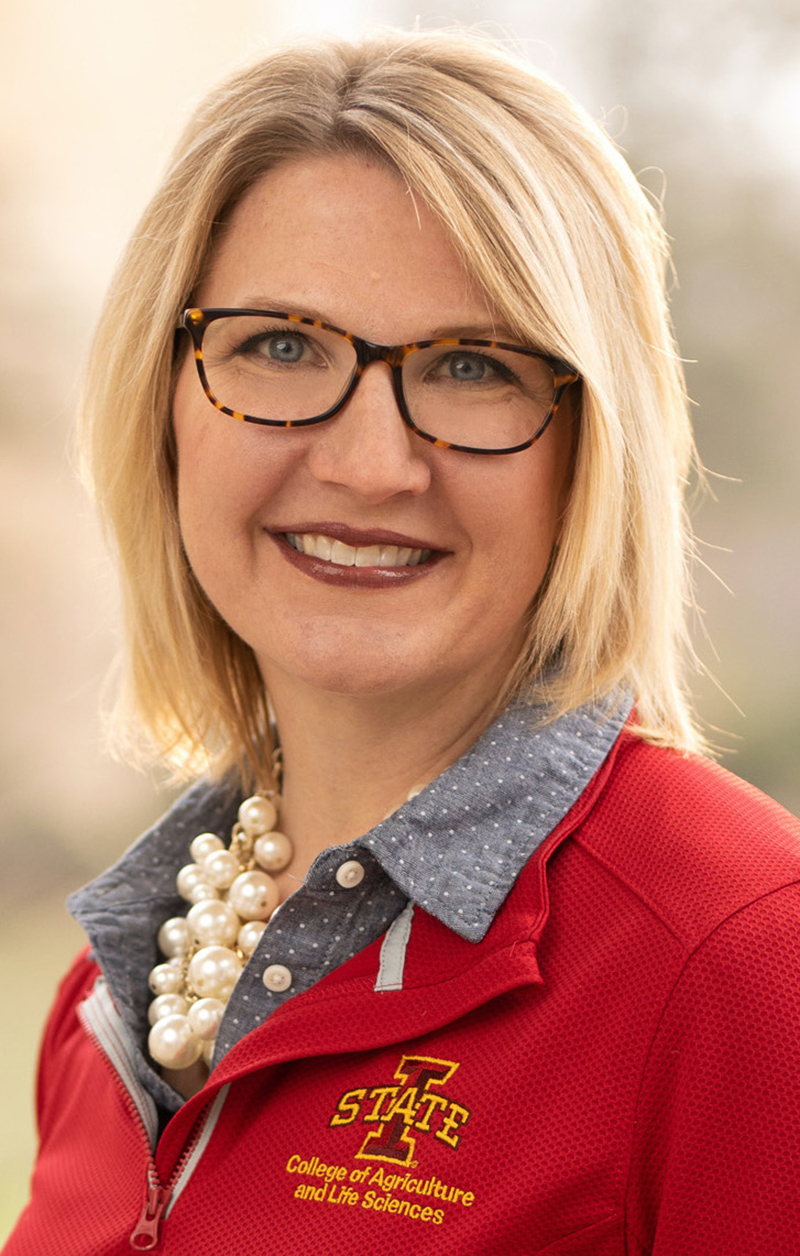
Melea Reicks Licht
Licht volunteered as a wayfinder.
A moment I'll remember: "Early in the day, a student came through with her mom. You could tell they were both so excited for her to be there and were eager to connect with volunteers. Seeing them together really emphasized that every one of these students is someone's child. I thought of all the moms and dads and grandmas and grandpas who would welcome these students home -- vaccinated -- in just a few short weeks.
"Something as simple as making eye contact with a student, smiling and gesturing for them to walk towards you can make a huge impact in their experience. The hardest part for me was not hugging every single one of them!"
How I felt as a volunteer: "Relieved. Hopeful. Optimistic. When I got in my car to drive home after my shift, I sat for a minute and let the significance of the day's events really sink in. We vaccinated 1,100 in less than eight hours. Every one of those people stand a much better chance of not getting COVID-19, or if they do, having a much milder case. That's 1,100 families at far less risk of losing someone they love. I wiped my eyes and drove home feeling like we were going to get through this.
"If you get a chance to volunteer, do it! Every role at the clinic makes a difference in our students' experience. The clinic is designed to keep everyone at a safe distance, so I never felt uncomfortable or at risk. The students really appreciated all the volunteers. I can't remember how many times I was thanked throughout the day."
What I'd tell someone who hasn't yet received their shot: "I understand you may be hesitant. There's a lot of misinformation out there. Please visit with your health care provider and check out trusted resources like the Iowa Department of Public Health and Iowa State University Extension and Outreach. It's important for each of us to do everything we can to keep our families and communities safe so we can return to a more active, open life."
Why State Gym is the spot for vaccines
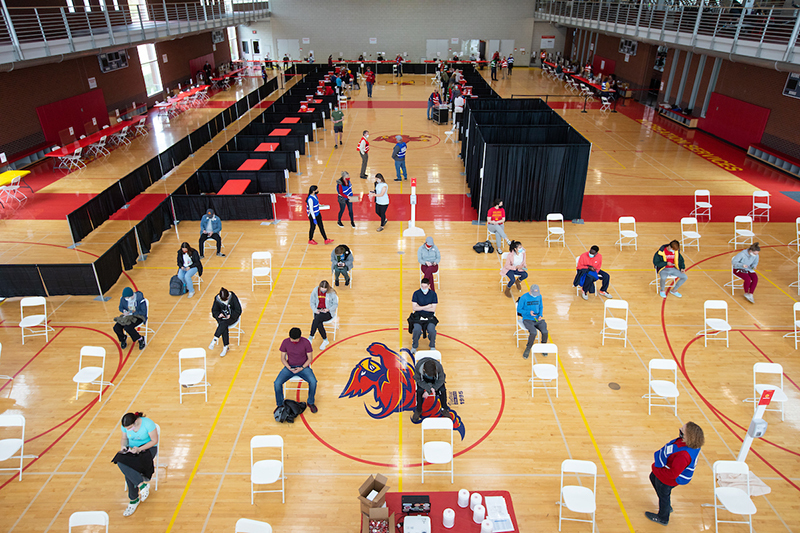
The three south courts at State Gym beat out other campus locations as the preferred site for the university's mass vaccination clinic. Photo by Christopher Gannon.
The way Mike Giles sees it, vaccines are as critical to students' health and wellness as fitness machines or a vigorous game of badminton. The recreation services director called it "a no-brainer" to move some programming from State Gym's three south courts to accommodate the university's mass vaccination clinic the second half of spring semester. It likely will continue into the third week of May.
"Our role is to serve the students -- and we do that through recreational opportunities. But this is a health pandemic and the clinic serves our students -- and faculty and staff, too," he said. "If we can help bring campus back to some level of normalcy heading into fall that allows all of us to get back to serving students at the level they're accustomed to, we're glad to do it."
Giles said one of the three courts held fitness equipment moved there this year to accommodate physical distancing during the pandemic, and it was moved to other spots in State Gym. The other two courts had been used in March for volleyball, badminton and pickleball, and those nets were relocated to the Lied recreation center.
"We were able to accommodate what we were losing at other locations. Maybe it wasn't as convenient and we recognize people like their routines, but for students and our members, very little was disrupted," Giles said.
Preparing a site
The university team tasked with setting up a vaccination clinic, led by emergency manager Clayton Oliver, toured and evaluated about 20 campus facilities as possible locations. Once senior leaders approved the State Gym site, units completed various accommodations to suit the layout plan. For example, to make the clinic fully accessible, a facilities planning and management team installed a concrete ramp in less than two days at the building's south entrance, the clinic's designated "front door" but previously an emergency exit. And recreation facilities staff purchased suction-adhered pulls for that same door void of exterior handles. Every morning of the clinic, the handles go on, and every evening they come off, Giles said.
"That's what happens when we act as one team to accomplish a task. Rec services is only one member, but we're very proud to be a part of that team," he added.
State's strengths
And why did State Gym get the nod? Oliver said the strengths of that location include:
- The three basketball courts provide more than 18,000 contiguous square feet -- and all of it is being used. Few locations on campus offer that much real estate in one space. The curtain walls allowed the emergency management team to scale up from the initial smaller clinics (using one court) to the current large-scale operation.
- Across-the-street proximity to the Thielen Student Health Center is convenient for retrieving supplies and adjusting the clinic's medical staff as needed, according to demand.
- Convenience also is a factor in getting people to come in, and State Gym is a walkable location for most students and many employees.
- To assure access control, it isn't necessary to "take over" the whole building. The clinic's footprint is contained to the south basketball courts, leaving the rest of the building open for normal student and employee use.
- A clinic in State Gym doesn't affect revenue-generating events. The facility is supported through student activity fees. Many of the other site options considered would have caused some disruption to academic, athletics or special events.
History repeats
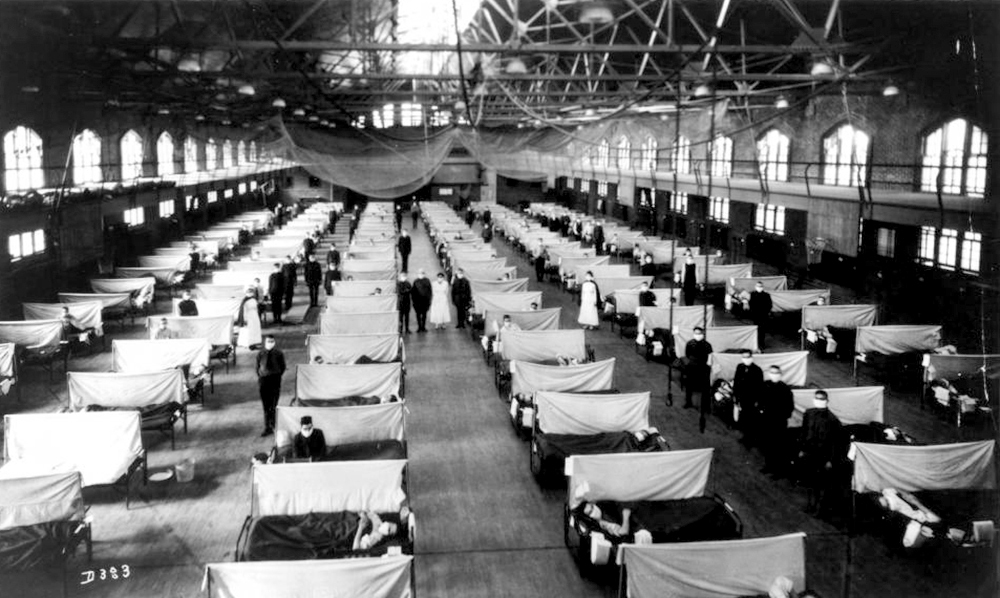
Rows of cots for soldiers suffering from Spanish influenza line the State Gym floor in 1918. Photo courtesy of university archives.
This spring is not the first time State Gym served the university during a pandemic. The lone court in a 5-year-old State Gymnasium was converted to a hospital for ill soldiers during the Spanish influenza pandemic of 1918, in the closing months of World War I. According to historical records, without a vaccine to protect against influenza infection -- and no antibiotics to treat secondary infections associated with influenza -- control efforts were limited to strategies such as isolation or quarantine, good personal hygiene, face coverings, use of disinfectants and limitations on public gatherings.
Reminder: Town hall with senior leaders is Thursday
University employees are invited to attend the President's Town Hall for faculty and staff today (April 29) at 1 p.m. via Webex. Town hall link. The one-hour gathering will feature an update on the campus vaccination clinic from Erin Baldwin, associate vice president for student health and wellness and director of the Thielen Student Health Center, and a discussion about COVID-19 vaccines with Dr. Dan Fulton, infectious disease specialist at McFarland Clinic.
Before you go
University human resources FAQ supplements April 19 memo on returning to campus workspaces
The rest of the town hall will be devoted to participants' questions. In addition to President Wendy Wintersteen and Baldwin, ISU leaders scheduled to attend to field questions are:
- Pam Cain, senior vice president for operations and finance
- Jon Wickert, senior vice president for academic affairs and provost
- Toyia Younger, senior vice president for student affairs
- Kristi Darr, vice president for university human resources
- John Lawrence, vice president for extension and outreach and chair of the Moving Forward Coordinating Committee
- Mike Norton, university counsel
- Paul Richmond, director of Environmental Health and Safety and chair of the COVID-19 Workforce Protection working group
- Ann Marie VanDerZanden, associate provost for academic programs and chair of the COVID-19 Academic Continuity working group
Take a virtual tour of the Student Innovation Center
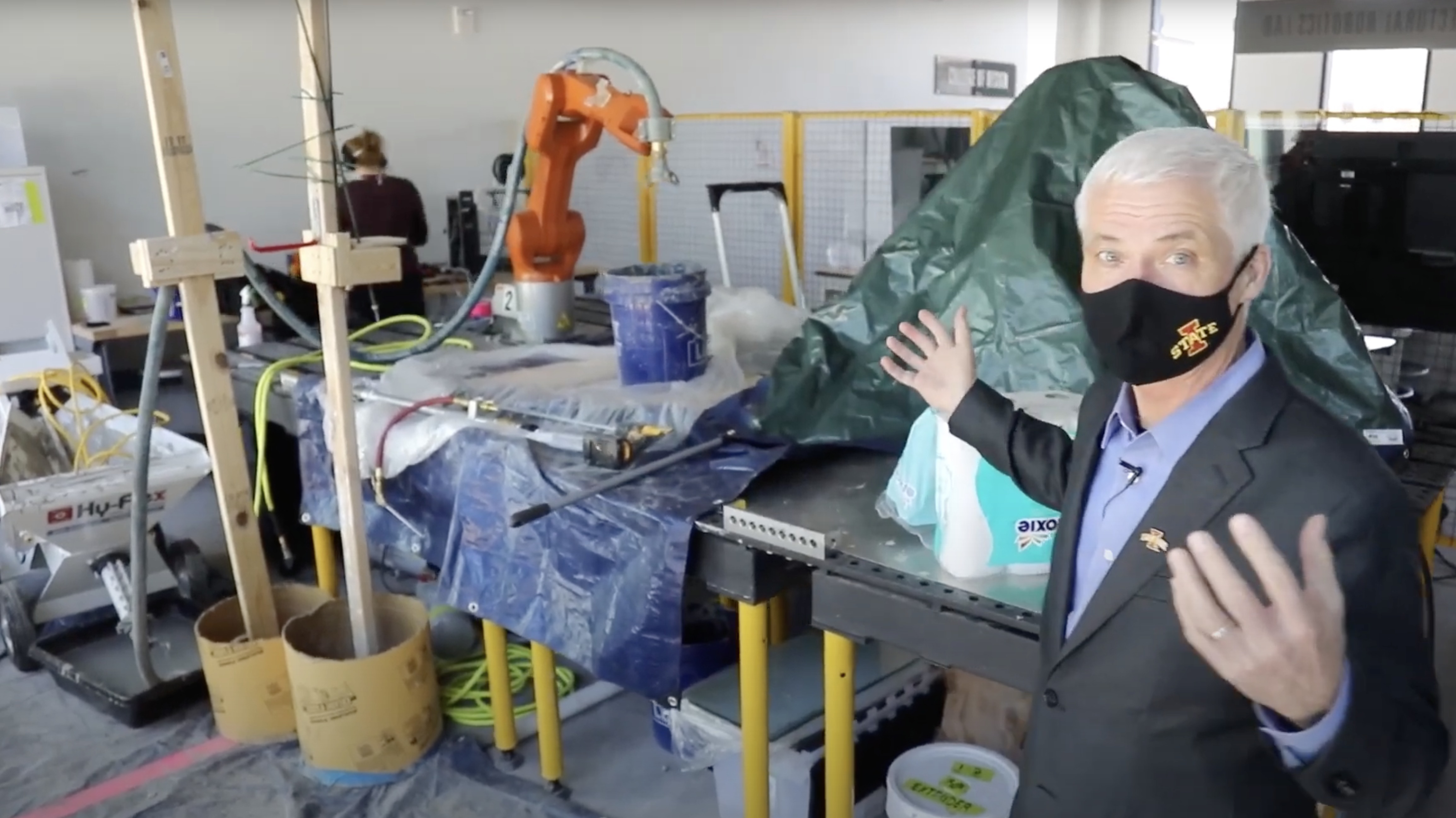
Student Innovation Center Jim Oliver showing off the architectural robotics laboratory as part of a virtual tour of the facility produced for the Ignite Innovation Showcase.
The COVID-19 pandemic struck last spring just before the Student Innovation Center opened, so many faculty and staff have heard a lot about it but have never been inside.
There's a lot to see. Though in-person activity is down this year on campus, there's been plenty going in the 140,000-square-foot, five-level building designed as a hub for experimentation, creation and collaboration. One of the sessions in the Ignite Innovation Showcase earlier this month provided a peek at the center's possibilities.
Center director Jim Oliver took viewers on a 13-minute guided walk-through of the facility's varied opportunities -- metal and wood fabrication and assembly, 3D printers, looms and knitting machines, a teaching kitchen, student-run retail shops, and areas devoted to glass-blowing, robotics, augmented reality, electronics, industrial design and entrepreneurship. There are numerous places for meeting, gathering and teaching -- including a classroom-in-the-round and spaces designed for team-based learning. Embedded audiovisual equipment throughout the center allows recording or livestreaming from nearly anywhere.
Watch the video to get a look inside the Student Innovation Center.
Flower power
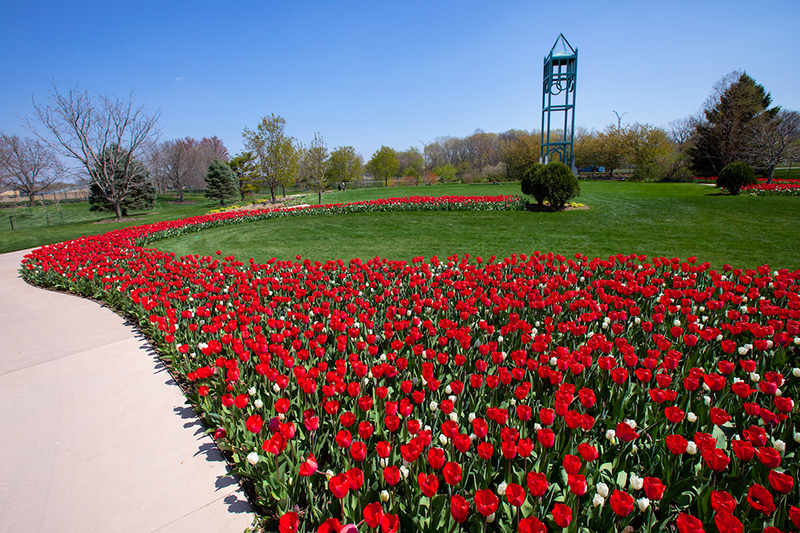
Photo by Christopher Gannon.
As it did last weekend, Reiman Gardens will remain open through 8 p.m. Thursday through Saturday (April 29-May 1) to give visitors additional time to enjoy the tulips and other spring blossoms. The gift shop will be open until 7:30 p.m. on these evenings, but the butterfly wing will close as usual at 4:30 p.m. Normal admission prices apply (free for members and ISU students with IDs.)
